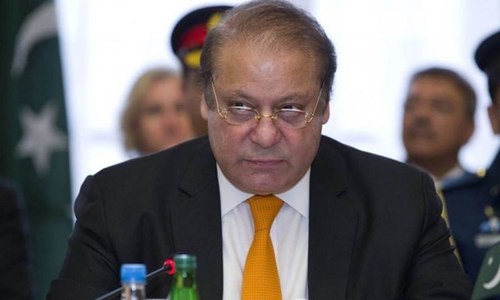WASHINGTON: Pakistan has rejected a perception that it is engaged in a nuclear race with India as a Pakistani delegation arrives here to participate in a nuclear security summit.
“It is disingenuous to create a perception that Pakistan has some grand strategy to recklessly build a nuclear arsenal to its own and the region’s peril,” says the country’s envoy in Washington, Jalil Abbas Jilani.
The summit, fourth and final of the Obama administration as it completes second term later this year, has brought focus on Pakistan’s tactical nuclear weapons because of its agenda.
“We cannot afford to wait for an act of nuclear terrorism before working together to collectively improve our nuclear security culture, share our best practices, and raise our standards for nuclear website, while introducing the agenda for the 2016 meeting.”
This led to a series of stories in the US media, claiming that terrorists could only access nuclear weapons in Pakistan because it is making small-sized (tactical) weapons and also because terrorists are actively fighting government forces in that country.
On March 20, CNN’s GPS show also did a programme on this issue, focusing exclusively on Pakistan, depicting it as country engaged in a nuclear race.
But in an interview to Dawn, Ambassador Jilani rejected the claim that Pakistan had the fastest growing nuclear arsenal as a “misplaced opinion based on theoretical assumptions”.
“The oft-paddled opinions on so-called tactical nuclear weapons are off the mark. Pakistan’s short-range missile is not a unique weapon system in South Asia. India also has such missiles for tactical use in the battlefield,” he says.
Ambassador Jilani pointed out that last week India had tested a long range submarine launched missile) in India Ocean, demonstrating that it has operationalised a nuclear triad.
“This test heralds nuclearisation of Indian Ocean with unforeseen consequence.”
The ambassador insisted that nuclear domain could not be separated from the conventional imbalance in South Asia.
“India arms imports, according to a Stockholm think-tank, increased by 90 per cent over the past five years as compared to previous five years,” he added. “India tops this unprecedented level of armament with war fighting doctrines such as cold start to win a war below nuclear threshold.”
Ambassador Jilani argued that all concerns about a nuclear race in South Asia could be resolved if India agreed to start a dialogue with Pakistan on a Strategic Restraint Regime as this regime also includes restraints on missiles.
“India has refused to consider this long-standing proposal by Pakistan. The ball is now in India’s court,” the ambassador said.
“Our troubled history with India, potential of outstanding conflicts to create tensions, deep-seated mistrust and India’s continued accumulation of conventional and nuclear capabilities leave Pakistan with no option but to invest in its own nuclear capability for defence.”
The ambassador pointed out that India separated weapon-grade plutonium in 1964, 22 years before Pakistan could even enrich uranium.
If the assumptions applied to Pakistan were also applied to India, it would show that New Delhi has “a much larger nuclear arsenal” and is “moving towards MIRVs (a multiple independently targetable reentry vehicle), which is ostensibly a destabilising move,” Mr Jilani argues.
“The country having the largest nuclear programme outside Non-Proliferation Treaty Regime is India and it continues to follow a maximalist approach in expanding its nuclear arsenal,” he warns.
Mr Jilani referred to an investigative December 2015 report by the Centre for Public Integrity, saying that India was expanding its arsenal of thermonuclear bombs by establishing new facilities for Uranium Enrichment and reprocess, which the report terms as a “nuclear city”.
He also referred to a report by the Jane’s magazine, which, he said, confirmed existence of these new and upcoming fissile materials sites being set up in India.
Mr Jilani urged the international community to note that a significant portion of India’s nuclear programme was outside any safeguards.
He quoted from a recent report by the Institute of Science and International Studies, Washington, claiming that India had 32 tons of plutonium in spent fuel along with reprocessing plants without safeguards.
“Availability of significant amounts of unsafeguarded nuclear materials and unsafeguarded reprocessing plants requires no further imagination to understand its likely military use,” Ambassador Jilani said.
He rejected concerns about the security of Pakistan’s nuclear arsenal as overblown.
“There has never been a nuclear security or safety related incident in Pakistan due to its robust Command and Control System”.
The ambassador said that this alarmist view provided “a convenient smokescreen” from reported incidents of nuclear theft in India.
He pointed out that in December 2015, the Centre for Public Integrity listed five specific incident of theft of nuclear materials in India.
Published in Dawn, March 30th, 2016













































